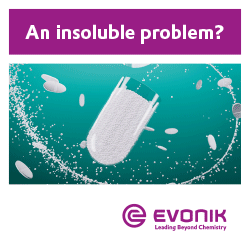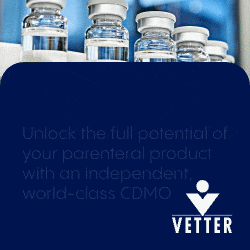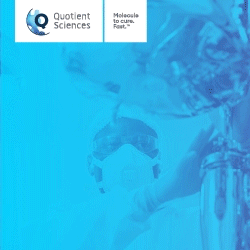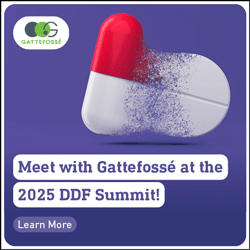issues
April 2021
Download PDFCOVER
EMULSIFICATION TECHNOLOGY - Microspheres for Sustained Release
Alex Kerr, Sam Trotter, and Poppy Maley explain how recent advances in biopolymers and manufacturing technology now enable formulation of injectable drug products to be tailored at will to achieve a target bioavailability in a shorter development time with robust and low cost of manufacture.
FEATURES
EMULSIFICATION TECHNOLOGY - Microspheres for Sustained Release
Alex Kerr, Sam Trotter, and Poppy Maley explain how recent advances in biopolymers and manufacturing technology now enable formulation of injectable drug products to be tailored at will to achieve a target bioavailability in a shorter development time with robust and low cost of manufacture.
SPECIAL FEATURE - Excipients: Far From Inactive
Contributor Cindy Dubin speaks with several innovative excipient companies that assert novel excipients – agglomerated, co-processed, and multifunctional – actively and safely affect formulation stability, solubility, and bioavailability as well as foster faster drug disintegration.
GLOBAL REPORT – 2020 Global Drug Delivery & Formulation Report: Part 2, Notable Drug Delivery and Formulation Product Approvals of 2020
In part 2 of this 4-part series, PharmaCircle, in collaboration with Drug Development & Delivery, focuses on notable drug delivery and formulation product approvals.
FORMULATION FORUM - Understanding of Amorphous Solid Dispersions & Their Downstream Development
Jim Huang, PhD, discusses how understanding the properties of ASDs and their relationship to downstream product scale up, stability, and in-vivo performance is critical to successfully utilize them for drug delivery of insoluble drugs in early development and commercialization in a timely and cost-effective manner.
INHALATION DELIVERY - Inhaled Drug Development: Optimizing Delivery
Sandy Munro, PhD, Nikki Willis, and Geraldine Venthoye, PhD, believe selecting the delivery device/platform on the basis of patient needs, nature of disease, and opportunities for accelerating the proof-of-concept or early clinical stages by using fast-to-clinic approaches can help to accelerate the project through later-stage development by combining the approach with seamless scalability, designing in manufacturability, and an appropriate manufacturing strategy.
BIOSIMILAR DEVELOPMENT - Guidance on Biosimilar Interchangeability: The Debate Over Drug Delivery Devices
Darren Mansell says as early experience in following this guidance has recently matured, some issues have arisen that may impede best available outcomes for patients, one of which is the question of whether “interchangeability” guidance may stifle innovation (and therefore improved patient experience) in drug delivery devices.
OPEN INNOVATION PLATFORM - Incentivizing Drug Delivery Research Using an Open Sharing Platform
Keith R. Horspool, PhD, Shirlynn Chen, PhD, and Markus Koester, PhD, discuss an open innovation platform to stimulate scientific understanding, and development of potential new technologies, for delivery of compounds with challenging solubility by offering a set of more contemporary poorly soluble drugs free-of-charge for independent research activities.
PRODUCT DEVELOPMENT STRATEGY - ESCP, Estimating Product Performance Part 2 – Choosing a Seesaw
Josef Bossart, PhD, introduces, in a series of short articles, a qualitative model to help understand and visualize the potential of a product with prescribers, patients, and payors. This simple model can help weed out product ideas that may at first glance seem attractive but offer little potential in the real world.
EXECUTIVE INTERVIEW - Celanese: Better Therapeutic Outcomes From Better Drug Delivery
Laura Brand, Vice President of Celanese’s Medical & Pharmaceutical Business, discusses her company’s drug delivery platform and the value it brings to the industry.
NUCLEAR β-CATENIN INHIBITOR - TBL1 - A Novel Target for Safe & Effective Blockade of the Nuclear β-catenin Signaling Pathway
Ruolan Han, PhD, explains how targeting TBL1/TBLR1 enables specific silencing of oncogenic Wnt target gene expression without affecting other necessary cellular functions that are disrupted when targeting higher up the Wnt pathway.
CLINICAL TRIALS - Considering Recurrent Events in Clinical Trials Statistical Analysis
Jennifer Rogers discusses how non-fatal recurring events, such as asthma attacks, epileptic seizures, and hospitalization for heart disease, have a certain manner in which they should be handled in clinical trials.
EXECUTIVE INTERVIEW - SDP Oncology: Uncovering New Biology
David J. Bearss, PhD, Chief Scientific Officer and Global Head of Research at SDP Oncology, discusses his company’s unique structure that has supported its robust research in the tumor immune microenvironment as well as its investigational assets being studied in this space.










